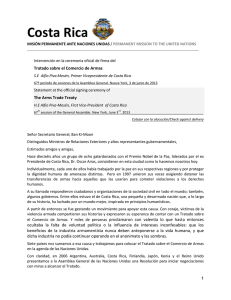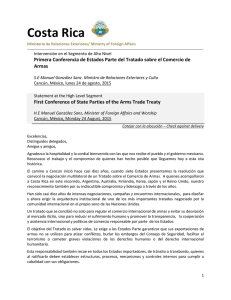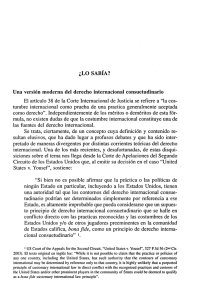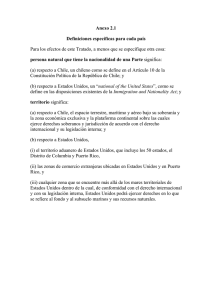Second Conference of States Parties to the Arms
Anuncio
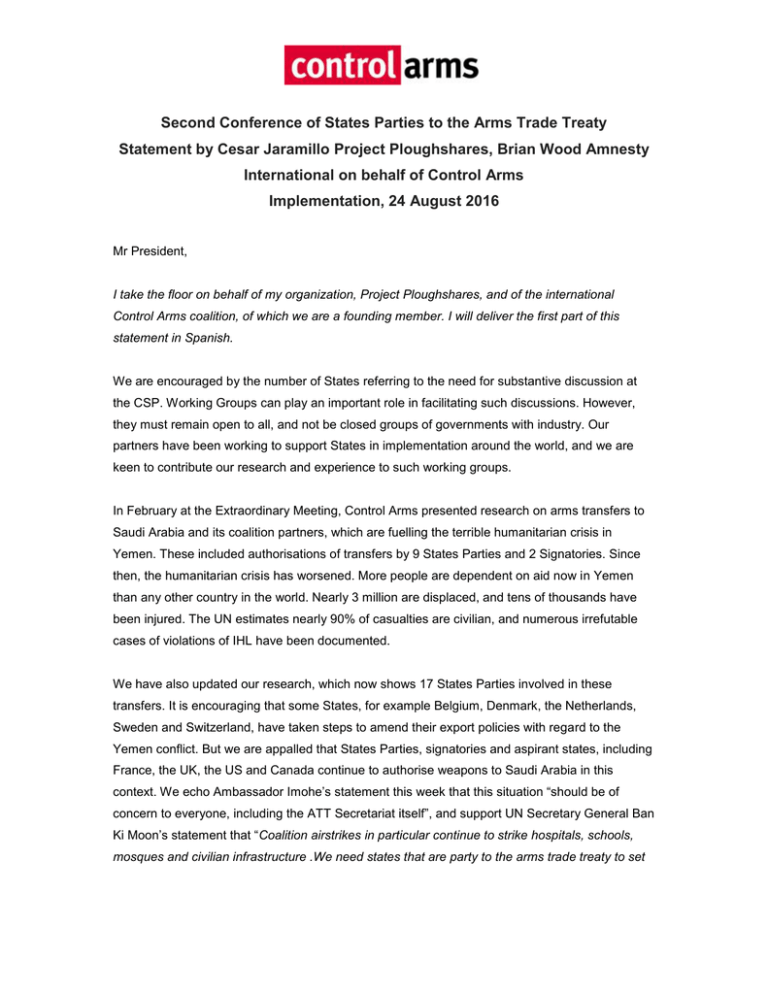
Second Conference of States Parties to the Arms Trade Treaty Statement by Cesar Jaramillo Project Ploughshares, Brian Wood Amnesty International on behalf of Control Arms Implementation, 24 August 2016 Mr President, I take the floor on behalf of my organization, Project Ploughshares, and of the international Control Arms coalition, of which we are a founding member. I will deliver the first part of this statement in Spanish. We are encouraged by the number of States referring to the need for substantive discussion at the CSP. Working Groups can play an important role in facilitating such discussions. However, they must remain open to all, and not be closed groups of governments with industry. Our partners have been working to support States in implementation around the world, and we are keen to contribute our research and experience to such working groups. In February at the Extraordinary Meeting, Control Arms presented research on arms transfers to Saudi Arabia and its coalition partners, which are fuelling the terrible humanitarian crisis in Yemen. These included authorisations of transfers by 9 States Parties and 2 Signatories. Since then, the humanitarian crisis has worsened. More people are dependent on aid now in Yemen than any other country in the world. Nearly 3 million are displaced, and tens of thousands have been injured. The UN estimates nearly 90% of casualties are civilian, and numerous irrefutable cases of violations of IHL have been documented. We have also updated our research, which now shows 17 States Parties involved in these transfers. It is encouraging that some States, for example Belgium, Denmark, the Netherlands, Sweden and Switzerland, have taken steps to amend their export policies with regard to the Yemen conflict. But we are appalled that States Parties, signatories and aspirant states, including France, the UK, the US and Canada continue to authorise weapons to Saudi Arabia in this context. We echo Ambassador Imohe’s statement this week that this situation “should be of concern to everyone, including the ATT Secretariat itself”, and support UN Secretary General Ban Ki Moon’s statement that “Coalition airstrikes in particular continue to strike hospitals, schools, mosques and civilian infrastructure .We need states that are party to the arms trade treaty to set an example in fulfilling one of the treaty’s main purposes – controlling arms flows to actors that may use them in ways that breach international humanitarian law.” As time here is not sufficient to go through the full details of our research and monitoring on this topic, we are formally submitting our views in writing to the conference, in accordance with Rule 5.1 of the Rules of Procedure, and request that these views be made available to the conference. I would now like to hand the microphone to my colleague who will continue our intervention on implementation, with a specific focus on human rights. Mr President , My name is Brian Wood, head of arms control and human rights at Amnesty International. Amnesty International has for over two decades campaigned with NGO partners to achieve robust, legally binding, rules on the international trade in conventional arms, to stem the flow of arms and munitions that fuel serious violations of international human rights and humanitarian law. It has been nearly two years since the Treaty entered into force and the need for effective implementation is painfully obvious as people’s lives continue to be devastated by the irresponsible trade in conventional arms all over the world. With this in mind, it is absolutely crucial that decisions taken at this Conference of States Parties contribute meaningfully to the protection of human rights. Mr President, as we move forward with implementation, the ATT must become more than a set of obligations. It must affect and improve States’ behaviour. Let us not lose sight of one of the key drivers behind the Treaty’s conception, which is the need to reduce human suffering. To this end, States Parties must ensure the establishment of effective procedures for the implementation of Articles 6 and 7 of the ATT. Prohibiting the transfer of conventional arms under Article 6, including for where it is known the arms would be used for war crimes, crimes against humanity and other crimes, requires competent legal expertise for the national licensing authorities, as well as detailed, credible and objective information gathering systems. States Parties must also ensure effective procedures and administrative resources to implement Article 7 so as not to authorize the export of conventional arms or related items when they pose an overriding risk of being used to commit or facilitate serious violations of international human rights law or international humanitarian law. Serious violations of international human rights law committed or facilitated using conventional arms are those that have a severe impact on individuals and are systematic or persistent, while serious violations of IHL carried out using conventional arms often include war crimes. Mr President, in our considered view, the treaty does not require a ‘balancing’ of export risks, as some officials and commentators have assumed, but rather exporting States Parties must carry out a thorough assessment to weigh up of all the risks of the possible ‘negative consequences’ of each potential export and then conclude whether the export would be either unlawful or too risky to authorize. Amnesty International is also calling for a requirement for arms exporters not to approve an arms transfer until importing states provide legally binding guarantees ensuring the intended end users of those arms will respect human rights and the rule of law. In Amnesty’s view public reporting is a key transparency mechanism that will help to assess how the ATT is being applied in practice, including its human rights provisions. A key aim of the ATT under Article 1 is to promote transparency, and that aim would be consistent with public reporting on arms imports and exports. Mr President, Amnesty International looks forward to playing a constructive role to ensure the Treaty’s implementation remains faithful to its founding spirit. Thank you. -----------ESPANOL Señor presidente, I take the floor on behalf of my organization, Project Ploughshares, and of the international Control Arms coalition, of which we are a founding member. I will deliver the first part of this statement in Spanish. Nos complace el número de Estados refiriéndose a la necesidad de un debate sustantivo en la Conferencia de Estados Parte. Los grupos de trabajo pueden desempeñar un papel importante en la facilitación de tales discusiones. Sin embargo, es de suma importancia que estos permanezcan abiertos a todos, y que no sean grupos cerrados sólo para gobiernos e industria. Los miembros de nuestra coalición han estado trabajando para apoyar en la implementación del Tratado a Estados alrededor del mundo, y seguimos dispuestos a contribuir con nuestra investigación y experiencia en los grupos de trabajo. En febrero, durante la Reunión Extraordinaria, la coalición Armas Bajo Control presentó una investigación sobre las transferencias de armas a Arabia Saudita y otros miembros de la coalición que está manteniendo viva la terrible crisis humanitaria en Yemen. Entre otras, se incluyen autorizaciones de transferencias de armas otorgadas por nueve Estados Partes y dos Signatarios. Desde entonces, la crisis humanitaria ha empeorado. Más personas dependen de la ayuda internacional ahora en aquel país que en cualquier otro en el mundo. Casi tres millones han sido desplazadas, y decenas de miles han resultado heridas. La ONU estima que casi el 90% de las víctimas son civiles y se han documentado numerosos casos irrefutables de violaciones del DIH. Nuestra investigación, que continuamos actualizando, muestra ahora que 17 Estados Partes del TCA aun participan de estas transferencias. Es alentador que algunos Estados, por ejemplo, Bélgica, Dinamarca, los Países Bajos, Suecia y Suiza, han tomado medidas para modificar sus políticas de exportación en relación con el conflicto de Yemen. Pero estamos consternados de que aun haya Estados Partes, Signatarios y Estados que han anunciado su intención de sumarse al Tratado -- entre ellos Francia, el Reino Unido, los EE.UU. y Canadá – que han seguido autorizando transferencias de armas a Arabia Saudita. Hacemos eco de la declaración del Embajador Imohe esta semana en el sentido de que esta situación “debe ser motivo de preocupación para todo el mundo, incluida la propia Secretaría del TCA”. Asimismo, apoyamos la declaración del Secretario General de la ONU, Ban Ki Moon, quien ha indicado que en Yemen “los ataques aéreos de la coalición continúan dañando hospitales, escuelas, mezquitas e infraestructura civil. Se requiere que los Estados Partes del TCA den ejemplo, cumpliendo uno de los propósitos principales del Tratado, que es el control de los flujos de armas a actores que pueden hacer uso de ellas en violación del Derecho Internacional Humanitario”. Dado que el tiempo del que disponemos ahora no es suficiente para resaltar todos los detalles de nuestro trabajo de investigación y seguimiento acerca de la implementación del TCA, hemos presentado formalmente nuestros puntos de vista por escrito a la Conferencia, de conformidad con la Regla 5.1 de las Reglas de Procedimiento y solicitamos que estas opiniones sean puestas a disposición de la misma. Ahora me gustaría pasar el micrófono a mi colega que continuará nuestra intervención acerca de la implementación del TCA, la cual se enfocará específicamente en la protección de los derechos humanos. Muchas gracias.
